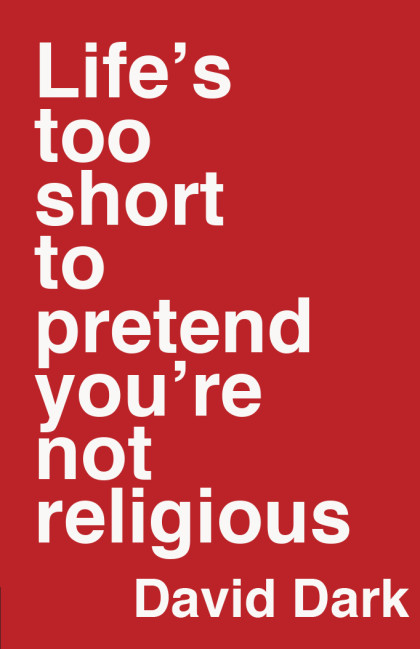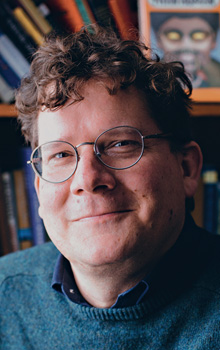
Recently the Emerging Scholars Network posted a quote from David Dark‘s new book Life’s Too Short to Pretend You’re Not Religious (Downer’s Grove, IL: InterVarsity Press, 2016):
When I label people, I no longer have to deal with them thoughtfully. I no longer have to feel overwhelmed by their complexity, the lives they live, the dreams they have. I know exactly where they are inside—or forever outside—my field of care, because they’ve been taken care of. The mystery of their existence has been solved and filed away before I’ve had a chance to be moved by them or even begun to catch a glimpse of who they might be. They’ve been neutralized. There’s hardly any action quite so undemanding, so utterly unimaginative, as the affixing of a label. It’s the costliest of mental shortcuts.
This quote strikes me as important to the life of a Christian in the academy.

It is important first because David points out a flaw in our theory on language – what it can do, what is its purpose.
While we often associate labeling as a ‘word thing’ and not therefore as important as our actions, David points out the wrongness of that approach. In short, words create action. “When I label people, I no longer have to deal with them thoughtfully.” When I label, I act differently toward them.
But more importantly, David exposes that we assume names or labels can ‘take care’ of others. Names or labels can ‘solve’ mysteries, neutralize critics, and of course get us somewhere we want to go faster, hence the shortcut.
This is not merely utterly unimaginative; it is a result of our fallen language. It is not also then something that is ‘cured’ by being Christian like so many other sins we think are. It also means more disturbingly that when we speak well of people, when we try to speak righteously about God, faith, and sin to others, we may be labeling in the fashion David describes.
In fact we are. Always. Already. All the time.
And so then the rather uncomfortable question arises: can I say anything at all? How do I speak without labeling?
In the rest of this post, I want to preliminarily address the root of the question. In a second post, I want to return to the original ‘scene of the crime’ for clues toward its character. In a third post, I want to suggest some ways we might address it. A fourth post will try to picture how the general ways of addressing it might be practiced in the academy.
When I say that labeling is part of our fallen language, I am purposely nodding toward Genesis 3, the scene of the crime. Here, as we all know, something happened. But we don’t acknowledge how that something that happened affected language. We know how it affected morals, relationships, attitudes, etc. But we label those things, no? We name those ‘things’ (a cliché of a label) and we do so at our peril and for better communication. This is why we have to ‘agree on the terms’ when we discuss things. This is why we need to understand what the other person is saying before we speak. This is why language is the ground for morals, relationships, and attitudes. The original sin may be pride to a host of theologians but I want to venture that it was overnaming.
I am borrowing that word from a Jewish scholar. Let me cut and paste part of the introduction to my dissertation (out in paperback 2025):
About a century ago, in his 1916 essay “On Language as Such and on the Language of Man,” Walter Benjamin wrote that the name is the “innermost nature of language itself,” the “true call of it.” Yet Benjamin notes that through “the fall of the spirit of language” the name has withered away. Benjamin claims this new, fallen language “can be approximately described as ‘overnaming’” (73). With this, Benjamin notes naming has not been erased, but changed by excessiveness. It is a kind of naming ‘beyond’ naming. Others have said it more theologically. Alain Badiou called it evil. “Evil is the will to name at any price,” he writes in “The Ethics of Truths: Construction and Potency” [Pli: The Warwick Journal of Philosophy 12 (2001): p. 253]. He adds evil is “the forcing of a nomination at the point of the unnameable.”
Overnaming is that action which David Dark notes is thought-less. When we overname we don’t have to think about people and so “feel overwhelmed by their complexity, the lives they live, the dreams they have . . .” And this is where Genesis 3 becomes important. Overnaming comes from a desire to speak like or as God—as the most authoritative namer, the one whose accounting of everything is indeed everything. We as the divine claim to ‘grasp’ the complexity.
But this claim is not merely abusive use of language. We have to name. We have to make creeds, write standards, and pray for certain outcomes. So it is not merely that we do this sin—overname, label, stereotype—when we are angry, sad, impatient, or sinning. It is a particular relation to language, one that is a feature of the human after that something happened in the garden.
I suggest that what we gained from the Fall—the knowledge of good and evil—is that which has affected language, that which has turned naming into overnaming.
Join me in the next post as I return to that garden to more thoughtfully name that something that happened
Matthew Boedy is an assistant professor of rhetoric and composition at the University of North Georgia. He has degrees from the University of Florida (BS) and the University of South Carolina (MFA and PhD). He enjoys books by Thomas Merton, Henri Nouwen, and Frederick Buechner. His research interests include the rhetoric of evil, ethics, and professional writing.

Leave a Reply